
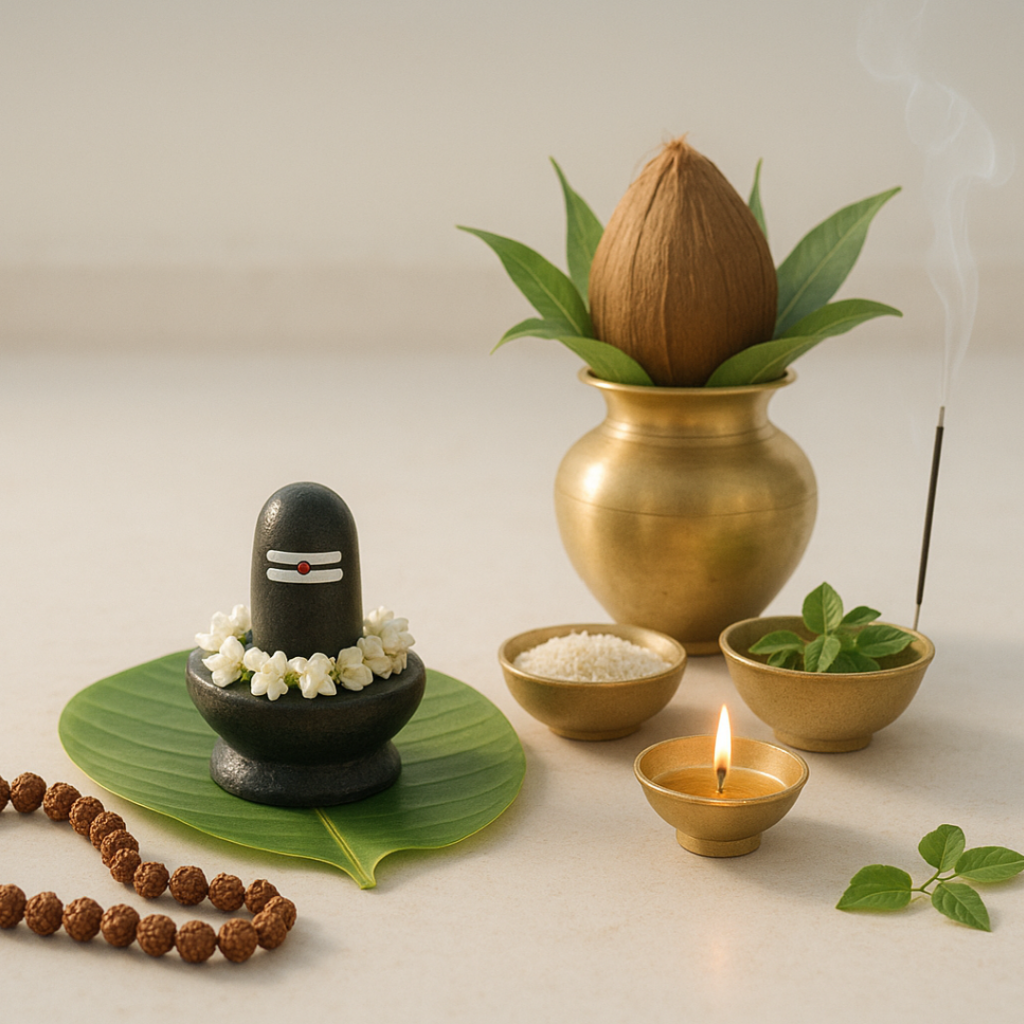
Ekadashi Vrat (एकादशी व्रत)
Ekadashi is the eleventh day of both the waxing (Shukla Paksha) and waning (Krishna Paksha) lunar phases in the Hindu calendar. Dedicated to Lord Vishnu, it is considered a spiritually powerful day for fasting, prayer, and self-discipline. Devotees observe Ekadashi vrat Katha (fast) to cleanse the mind, body, and soul and seek divine blessings.

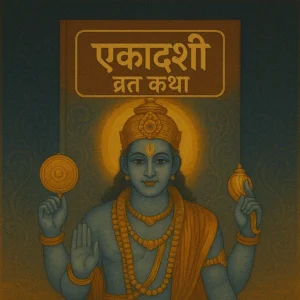
Ekadashi Vrat Katha (एकादशी व्रत कथा)
Once there lived a poor Brahmin who was deeply troubled by his poverty. Despite being devoted and sincere, he could hardly earn enough to survive. One day, a sage visited his village. The Brahmin respectfully welcomed the sage and shared his miseries. Pleased by his hospitality and humility, the sage advised him to observe the Amavasya Vrat and perform Pitru Tarpan (ancestral offerings) with complete devotion.
The Brahmin followed the sage’s instructions and observed Amavasya Vrat sincerely every month. Gradually, his life began to change. He found small sources of income, his family conditions improved, and peace returned to his home. More importantly, he started experiencing blessings in unexpected ways, which he believed were from his satisfied ancestors.
This story teaches that observing Amavasya Vrat with faith not only pleases Lord Vishnu and Lord Shiva but also brings peace to departed souls and removes negativity and ancestral curses from one’s life.
God Worshipped
Lord Vishnu
Day Observed
Twice a month
Associated Color
White or Yellow
God Worshipped
Lord Vishnu
Day Observed
Twice a month
Associated Color
White or Yellow
Ekadashi Vrat List Dates of 2025
January 10 (Friday) – Pausha Putrada Ekadashi
January 25 (Saturday) – Shattila Ekadashi
February 8 (Saturday) – Jaya Ekadashi
February 24 (Monday) – Vijaya Ekadashi
March 10 (Monday) – Amalaki Ekadashi
March 25 (Tuesday) – Papmochani Ekadashi
April 8 (Tuesday) – Kamada Ekadashi
April 24 (Thursday) – Varuthini Ekadashi
May 8 (Thursday) – Mohini Ekadashi
May 23 (Friday) – Apara Ekadashi
June 6 (Friday) – Nirjala Ekadashi
June 21 (Saturday) – Yogini Ekadashi
July 6 (Sunday) – Devshayani Ekadashi
July 21 (Monday) – Kamika Ekadashi
August 5 (Tuesday) – Shravana Putrada Ekadashi
August 19 (Tuesday) – Aja Ekadashi
September 3 (Wednesday) – Parsva Ekadashi
September 17 (Wednesday) – Indira Ekadashi
October 3 (Friday) – Papankusha Ekadashi
October 16 (Thursday) – Rama Ekadashi
November 1 (Saturday) – Devutthana Ekadashi
November 15 (Saturday) – Utpanna Ekadashi
December 1 (Monday) – Mokshada Ekadashi
December 15 (Monday) – Saphala Ekadashi
December 30 (Tuesday) – Pausha Putrada Ekadash
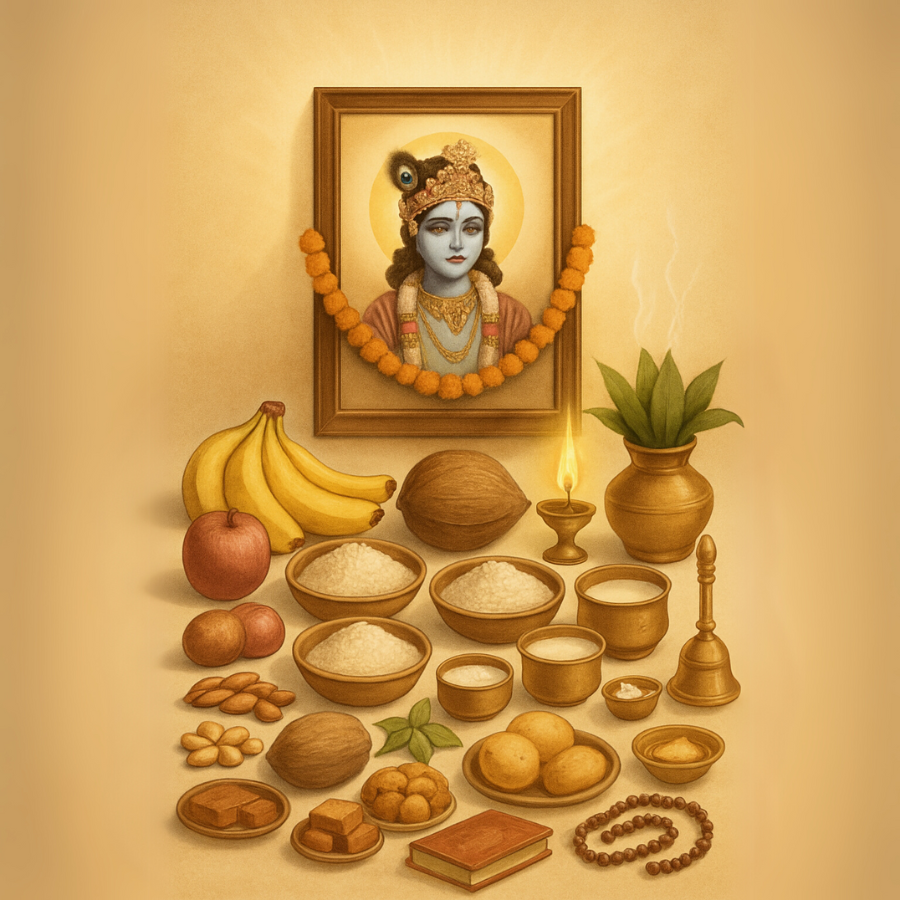
Ekadashi Vrat Pooja Kit (Ekadashi Vrat)
Kalash (water pot)
Incense sticks (agarbatti)
Diya (lamp) with oil or ghee
Cotton wicks
Flowers (especially tulsi leaves)
Fruits (for naivedya)
Panchamrit (milk, curd, honey, ghee, sugar)
Rice or raw grains (akshata)
Chandan (sandalwood paste)
Kumkum and Haldi
Betel leaves and nuts
Picture or idol of Lord Vishnu
Tulsi leaves (essential for Lord Vishnu)
Camphor (kapoor) for aarti
Clean cloth or mat for pooja setup
Ekadashi Vrat Katha book
Importance of Ekadashi Vrat
Considered highly auspicious for worshipping Lord Vishnu.
Helps in spiritual cleansing and growth.
Observing Ekadashi promotes self-discipline and control over desires.
It is believed to destroy sins and bring peace to ancestors.
Benefits of Ekadashi Vrat
Enhances mental clarity and emotional balance.
Supports digestive health through fasting.
Helps release negative karma and spiritual burden.
Attracts divine blessings and prosperity.
Promotes inner peace and spiritual elevation.
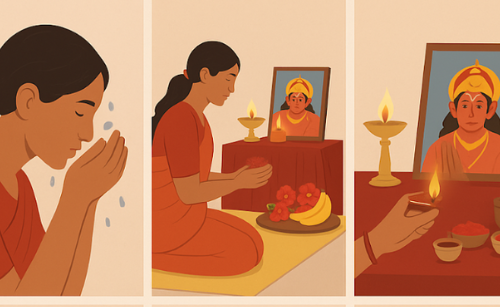
Procedure of Ekadashi Vrat Fast Puja
Wake up early and take a bath before sunrise.
Clean your home and altar space.
Install an idol/photo of Lord Vishnu and offer yellow flowers, incense, and diya.
Recite Vishnu Sahasranama, Gita, or Ekadashi Vrat Katha.
Observe fast (nirjala, phalahar, or light sattvic meal) based on your health and devotion.
Avoid negative thoughts, and spend the day in spiritual activities.
Offer tulsi leaves, fruits, and milk-based sweets to the deity.
Break the fast (Parana) on the next day (Dwadashi) after offering food to Brahmins or the needy.
Reading Ekadashi Vrat Katha Book.
Types of Ekadashi Vrat
Putrada Ekadashi (Paush Shukla Paksha)
Significance: Known for blessing childless couples with progeny.
Special Worship: Devotees pray to Lord Vishnu and offer Tulsi leaves. Reading the Putrada Ekadashi Vrat Katha is considered auspicious.
Shattila Ekadashi (Paush Krishna Paksha)
Significance: Emphasizes the importance of donating sesame seeds (til).
Special Worship: Use sesame seeds in bathing, food, charity, and offerings to Vishnu.
Jaya Ekadashi (Magha Shukla Paksha)
Significance: Helps one attain victory over sins and ghosts.
Special Worship: Chanting Vishnu Sahasranama and reading the Jaya Ekadashi Katha is ideal.
Vijaya Ekadashi (Magha Krishna Paksha)
Significance: Aids in removing obstacles and achieving success, especially before travel.
Special Worship: Devotees light lamps and offer yellow sweets to Vishnu.
Amalaki Ekadashi (Phalguna Shukla Paksha)
Significance: Associated with worship of the Amla (gooseberry) tree, symbolizing purity.
Special Worship: Amla trees are worshipped along with Vishnu.
Papmochani Ekadashi (Phalguna Krishna Paksha)
Significance: Known for relieving sins and evil thoughts.
Special Worship: Devotees meditate and chant Vishnu mantras for purification.
Kamada Ekadashi (Chaitra Shukla Paksha)
Significance: Grants wishes and relieves curses, especially related to love and relationships.
Special Worship: Offer prayers to Lord Krishna with flowers and sweets.
Varuthini Ekadashi (Chaitra Krishna Paksha)
Significance: Provides protection from evil and misfortunes.
Special Worship: Donations, especially to Brahmins, are highly recommended.
Mohini Ekadashi (Vaishakha Shukla Paksha)
Significance: Helps in overcoming desires and spiritual illusions.
Special Worship: Chanting the Gita and donating food brings merit.
Apara Ekadashi (Vaishakha Krishna Paksha)
Significance: Atonement for past sins and liberation from negative karma.
Special Worship: Devotees offer milk and light diyas near Tulsi plants.
Nirjala Ekadashi (Jyeshtha Shukla Paksha)
Significance: Known as the strictest Ekadashi, where even water is avoided.
Special Worship: Fasting without water gives the virtue of all 24 Ekadashis.
Yogini Ekadashi (Jyeshtha Krishna Paksha)
Significance: Cleanses the body of diseases and relieves misdeeds.
Special Worship: Chanting Vishnu mantras and offering milk and sweets is common.
Devshayani / Ashadhi Ekadashi (Ashadha Shukla Paksha)
Significance: Marks the start of Chaturmas, when Lord Vishnu goes into yogic sleep.
Special Worship: Start of a 4-month period of extra devotion and abstinence.
Kamika Ekadashi (Ashadha Krishna Paksha)
Significance: Ideal for resolving conflicts and earning blessings for the ancestors.
Special Worship: Lighting ghee lamps and chanting the Vishnu Sahasranama.
Shravana Putrada Ekadashi (Shravana Shukla Paksha)
Significance: Another Ekadashi for blessings of children and family harmony.
Special Worship: Worship Lord Vasudev and feed Brahmins.
Aja Ekadashi (Shravana Krishna Paksha)
Significance: Eliminates sins and grants Moksha (liberation).
Special Worship: Recite Ramcharitmanas and Vishnu stories.
Parsva Ekadashi (Bhadrapada Shukla Paksha)
Significance: Known for turning off Lord Vishnu during sleep in Vaikuntha.
Special Worship: Donating to the needy and observing fast is emphasized.
Indira Ekadashi (Bhadrapada Krishna Paksha)
Significance: Helps in liberating ancestors from hell (Pitru Moksha).
Special Worship: Shraddha rituals and tarpan for forefathers.
Papankusha Ekadashi (Ashwin Shukla Paksha)
Significance: Brings spiritual progress and heavenly blessings.
Special Worship: Offer lotus flowers to Vishnu and chant divine names.
Rama Ekadashi (Ashwin Krishna Paksha)
Significance: Observed for wealth, peace, and detachment from materialism.
Special Worship: Perform Vishnu puja with white sweets and bhajans.
Devutthana / Prabodhini Ekadashi (Kartik Shukla Paksha)
Significance: End of Chaturmas and the awakening of Lord Vishnu.
Special Worship: Start of auspicious events like Tulsi Vivah and marriages.
Utpanna Ekadashi (Kartik Krishna Paksha)
Significance: Marks the origin of Ekadashi vrat itself.
Special Worship: Begin Ekadashi vrat from this day for newcomers.
Mokshada Ekadashi (Margashirsha Shukla Paksha)
Significance: Helps attain liberation (Moksha) and peace for ancestors.
Special Worship: Reading the Bhagavad Gita is especially meritorious.
Saphala Ekadashi (Margashirsha Krishna Paksha)
Food Items Do's and Don'ts for Ekadashi Vrat
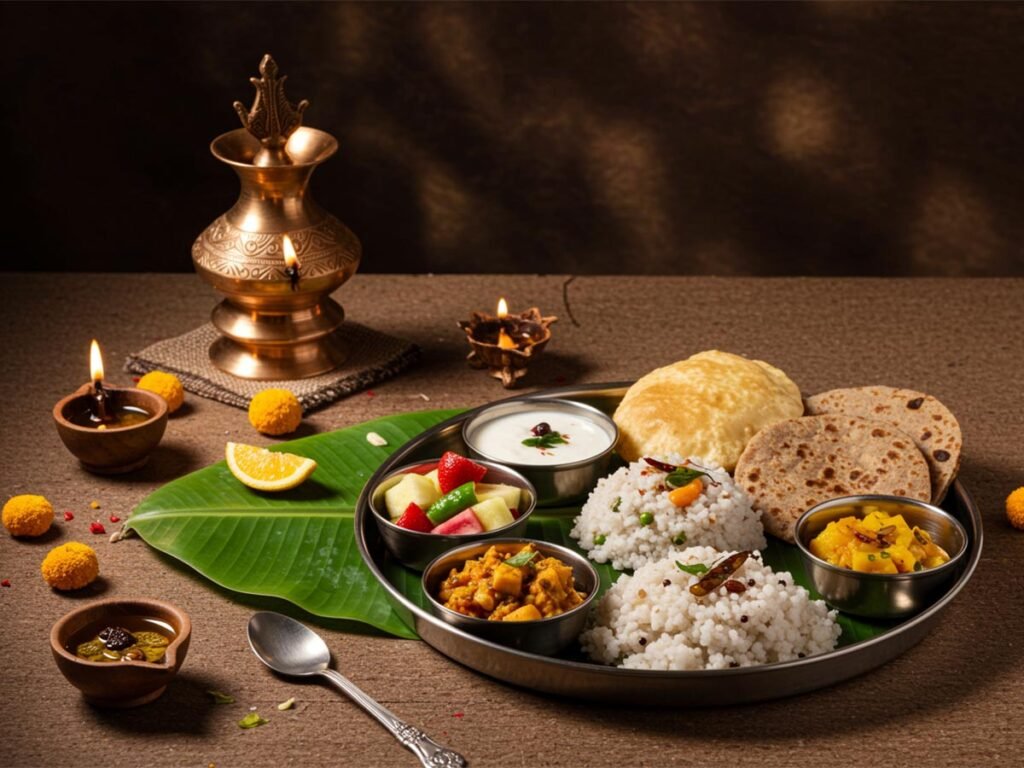
What to Eat on Ekadashi Vrat
Fruits (banana, apple, papaya, etc.)
Sabudana (khichdi, vada, or kheer)
Samak rice (vrat ke chawal)
Potatoes and sweet potatoes
Rock salt
Milk, curd, and other dairy products
Dry fruits and coconut water
Food Items to Avoid in Ekadashi Vrat
Rice and wheat-based grains
Lentils and legumes
Onion and garlic
Processed or fried food
Meat, fish, and eggs
Caffeinated drinks and alcohol
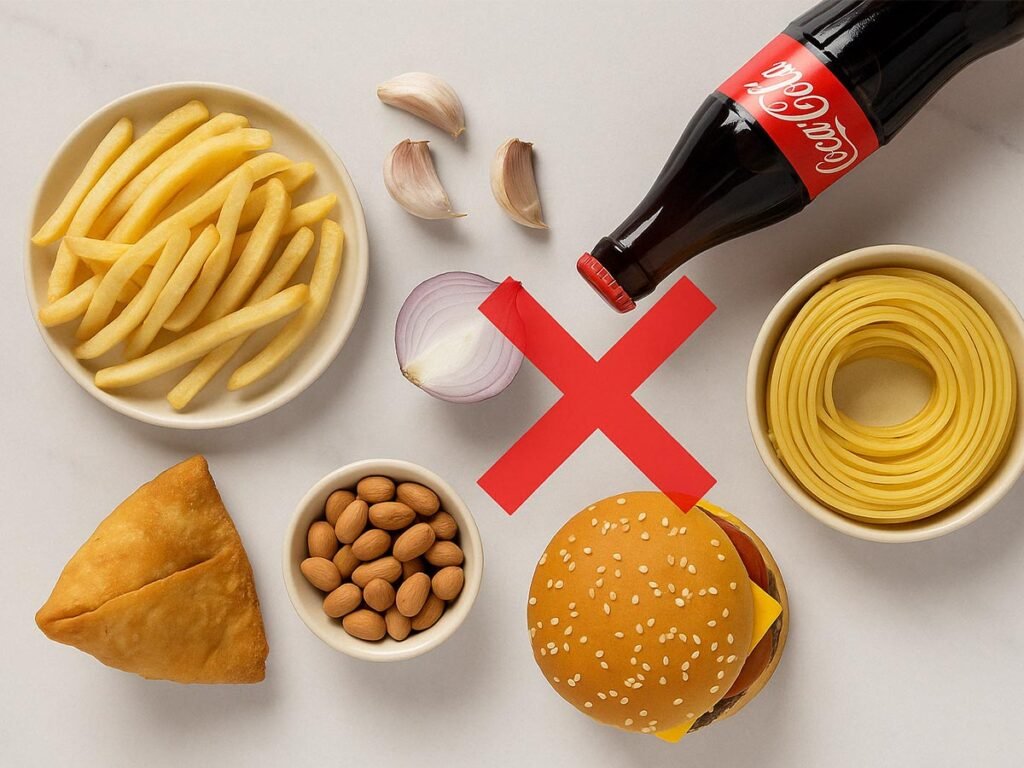
Frequently Asked Questions - Ekadashi Vrat
Can I drink water during Ekadashi fast?
Yes, unless you’re observing a nirjala vrat which prohibits both food and water.
What happens if I mistakenly eat rice on Ekadashi?
While it’s not ideal, you can pray for forgiveness and observe the next Ekadashi with sincerity.
Can children and elderly observe Ekadashi?
Yes, they can observe a light or partial fast, depending on health.
Why is rice avoided on Ekadashi?
According to scriptures, eating rice on Ekadashi attracts negative energy and is believed to disrupt spiritual progress.
Can I sleep during the day on Ekadashi?
It’s advised to stay awake, chant mantras, and engage in spiritual activities, though light rest is acceptable if needed.
